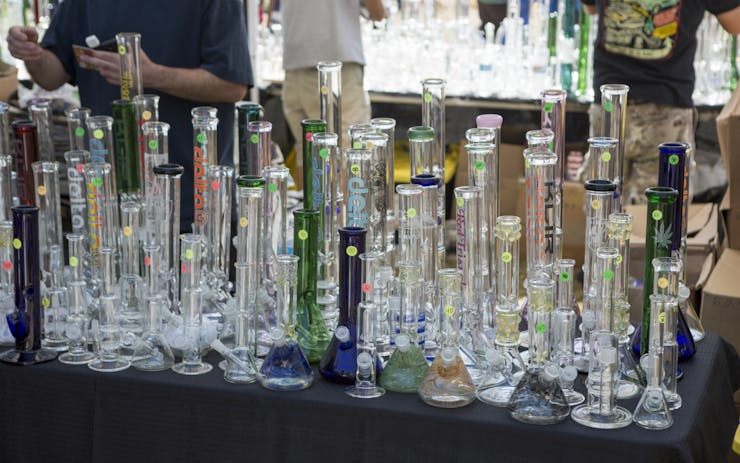By July 2018, adult-use recreational cannabis is scheduled to become legal across Canada—and it’s not just simple possession that’s being legalized. Here are five cannabis-related goods and activities that Trudeau’s Cannabis Act will make legal for adult Canadians.
1. Bongs, pipes and other accessories will finally be legal
Wait, what? Bongs are illegal in Canada?! Yes, technically, though it’s a law that’s rarely enforced any more. With the Cannabis Act, this law will be amended so that the sale and possession of cannabis accessories will finally become completely legal. (Well, almost completely legal—entities selling cannabis accessories will be subject to rules restricting the promotion and display of such goods, particularly in regard to youth exposure and access.)
Under the Cannabis Act, individuals will be able to give—but not sell—up to 30 grams of cannabis to other adults.
2. Growing your own and giving some to an adult friend
Just like they have it in Colorado, Canadians will be able to grow their own cannabis. In the initial version of the bill, Canadians were to be limited to four plants and a 100cm height limitation. In the revised version, the 100cm limit has been removed, though the four-plant limit remains. Under the Cannabis Act, individuals will be able to distribute—but not sell—up to 30 grams of cannabis to other adults. This would allow individuals to grow a little and ‘gift’ some to a friend. Just not for money.
3. Wine cellars… but with cannabis
Under Canada’s legalization plan, there is no federal limit on the amount of cannabis one can possess privately in their own residence. What this little loophole may spur is anyone’s guess, but when I first mentioned this part of the proposed law on Twitter, I had more than one person exclaim that this could allow wine cellar-like cannabis collections. It probably wouldn’t look exactly like a wine cellar, but Canadian cannabis connoisseurs will be able to collect all the cannabis they can amass in their private residence—unless the country’s provinces decide to put such limits on it within their borders.
Under Canada’s legalization plan, there is no federal limit on the amount of cannabis one can possess privately in their own residence.
4. Weed weddings?
Since states south of the border have legalized, cannabis-loving couples have been adding cannabis elements to their weddings. In Canada, throwing a cannabis wedding—where cannabis-infused products appear alongside alcohol at the bar and guests are given cannabis-flower parting gifts—appears to be something that will be legal. As long as you’re distributing under 30 grams to each guest–and as mentioned above, don’t “sell” it – you would not be violating the proposed federal law.
However! Ottawa-based cannabis lawyer Trina Fraser believes it may be actually be tougher than it looks to legally hold weed weddings come legalization. That’s because third-party commercial venues cannot themselves possess or distribute the cannabis. Fraser also believes that the 30-gram limit on distribution does not apply per person, but rather in total. Time will tell whether authorities and Canadians at large warm up to cannabis weddings.
5. Personal extraction of cannabis using non-organic solvents
In 2015, a year after Colorado legalized adult-use recreational cannabis, the state followed up with a law banning the use of combustible organic solvents in cannabis extraction. In Canada, officials are restricting the use of organic solvents right out of the gate, but is otherwise allowing extraction of cannabis. It looks like the bill implicitly allows the use of non-organic solvents and solvent-free extraction devices, as long as you’re extracting it for your own use. (Look for Canada to see a rise in the sale of rosin presses and bubble bags.)
So there you have it, five things the Cannabis Act will legalize beyond mere possession. A final word of caution: It’s possible that provinces and municipalities may enact their own offences and regulations closer to legalization date, so not everything is set in stone. (For example, there may be registration requirements for personal cultivation or other conditions.) Stay tuned.





